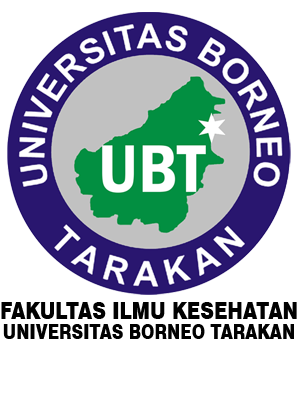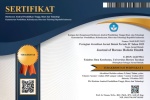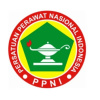Social Support Sebagai Faktor Prediktor Perilaku Periksa Payudara Sendiri (SADARI) Pada Mahasiswi Kesehatan
Abstract
Breast cancer is a type of cancer that often occurs in women. Currently, cancer patients are young, and there are quite a few teenage girls in their teens. Breast Self-Examination (BSE) is a national program for breast cancer prevention, but many women still do not perform it. Many factors influence it, one of which is social support. This research aims to determine the relationship between social support and breast self examination behavior among health students. This research uses a cross-sectional study design with a total of 297 respondents. Two questionnaires were used in this study, including the BSE behavior questionnaire and the social support questionnaire using the Medical Outcomes Study Social Support Survey (MOSS-SSS). Data were analyzed using univariate analysis for the description and distribution of each variable and bivariate analysis using chi-square correlation. More than half of the respondents, 164 (55.2%), in this study received positive social support. Most respondents, 228 (76.8%), do not routinely perform BSE . This study found a significant relationship between social support and BSE behavior (p<0.0001). Social support plays an important role in BSE behavior. In the future, healthcare workers have a role in enhancing social support in efforts to improve women's behavior in performing early detection of breast cancer.
Keywords
Full Text:
PDF (Bahasa Indonesia)References
Abu-Helalah, M. A., Alshraideh, H. A., Al-Serhan, A.-A. A., Kawaleet, M., & Nesheiwat, A. I. (2015). Knowledge, barriers and attitudes towards breast cancer mammography screening in Jordan. Asian Pacific Journal of Cancer Prevention, 16(9), 3981-3990.
Akram, M., Iqbal, M., Daniyal, M., & Khan, A. U. (2017). Awareness and current knowledge of breast cancer. Biological research, 50, 1-23.
Al-Azmy, S. F., Alkhabbaz, A., Almutawa, H. A., Ismaiel, A. E., Makboul, G., & El-Shazly, M. K. (2013). Practicing breast self-examination among women attending primary health care in Kuwait. Alexandria Journal of Medicine, 49(3), 281-286.
Anggraeni, S., & Handayani, E. (2019). Faktor-faktor yang mempengaruhi perilaku pemeriksaan payudara sendiri (SADARI) pada mahasiswi non kesehatan UIN antasari banjarmasin. Jurnal Kesehatan Indonesia, 9(2), 76-83.
Anggraini, N. N. (2017). Hubungan karakteristik dan dukungan tenaga kesehatan dengan perilaku wanita usia subur (WUS) tentang pemeriksaan payudara sendiri (SADARI) untuk deteksi dini kanker payudara di Kelurahan Bulustalan Kota Semarang. Jurnal Kebidanan, 6(2), 68-73.
Barati, M., Shoar, L. M., Mohammadi, Y., & Dogonchi, M. (2019). Factors affecting breast self-examination behavior among female healthcare workers in Iran: The role of social support theory. Journal of Preventive Medicine and Public Health, 52(4), 224.
Baron-Epel, O. (2010). Attitudes and beliefs associated with mammography in a multiethnic population in Israel. Health Education & Behavior, 37(2), 227-242.
Barrow, J. M., Brannan, G. D., & Khandhar, P. B. (2021). Research ethics. In StatPearls [Internet]: StatPearls Publishing.
Bashirian, S., Barati, M., Shoar, L. M., Mohammadi, Y., & Dogonchi, M. (2019). Factors affecting breast self-examination behavior among female healthcare workers in Iran: The role of social support theory. Journal of Preventive Medicine and Public Health, 52(4), 224-233.
Emilee, G., Ussher, J. M., & Perz, J. (2010). Sexuality after breast cancer: a review. Maturitas, 66(4), 397-407.
Farhadifar, F., Taymoori, P., Bahrami, M., & Zarea, S. (2015). The relationship of social support concept and repeat mammography among Iranian women. BMC women's health, 15(1), 1-8.
Fatayati, A. (2015). Hubungan Dukungan Sosial terhadap Perilaku Pemeriksaan Payudara Sendiri (Sadari) di Wilayah Kerja Puskesmas Manyaran Kabupaten Wonogiri. UNS (Sebelas Maret University),
Harnianti, H., & Saptaputra, S. (2017). Studi Perilaku Pemeriksaan Payudara Sendiri (SADARI) Pada Mahasiswi Fakultas Kesehatan Masyarakat Universitas Halu Oleo Tahun 2016. Haluoleo University,
IARC.WHO.Int. 2022. World Cancer Day 2021: Spotlight on IARC research related to breast cancer – IARC. [online] Available at: [Accessed 2 April 2022]
Karnawati, P. W. W., & Suariyani, N. L. P. (2022). Faktor Yang Memengaruhi Perilaku Pemeriksaan Payudara Sendiri (Sadari) Pada Wanita Usia Subur. Health.
Kemenkes, R. (2022). Kanker Payudara Paling Banyak di Indonesia, Kemenkes Targetkan Pemerataan Layanan Kesehatan. Retrieved from https://sehatnegeriku.kemkes.go.id/baca/umum/20220202/1639254/kanker-payudaya-paling-banyak-di-indonesia-kemenkes-targetkan-pemerataan-layanan-kesehatan/
Kissal, A., Vural, B., Ersin, F., & Solmaz, T. (2018). The effect of women’s breast cancer fear and social support perceptions on the process of participating in screening. Global Health Promotion, 25(3), 52-59.
Magrath, I., & Epelman, S. (2013). Cancer in adolescents and young adults in countries with limited resources. Current oncology reports, 15, 332-346.
Notoatmodjo, S. (2012). Promosi kesehatan dan perilaku kesehatan. Jakarta: rineka cipta, 193.
Novak, A. (2014). Anonymity, confidentiality, privacy, and identity: The ties that bind and break in communication research. Review of communication, 14(1), 36-48.
Ogunbode, A., Fatiregun, A., & Ogunbode, O. (2015). Breast self-examination practices in Nigerian women attending a tertiary outpatient clinic. Indian journal of cancer, 52(4), 520-524.
Sarina, S., Thaha, R. M., & Nasir, S. (2020). Faktor Yang Berhubungan Dengan Perilaku Sadari Sebagai Deteksi Dini Kanker Payudara Pada Mahasiswi FKM Unhas. Hasanuddin Journal of Public Health, 1(1), 61-70.
DOI: https://doi.org/10.35334/borticalth.v8i1.5980
Refbacks
- There are currently no refbacks.









